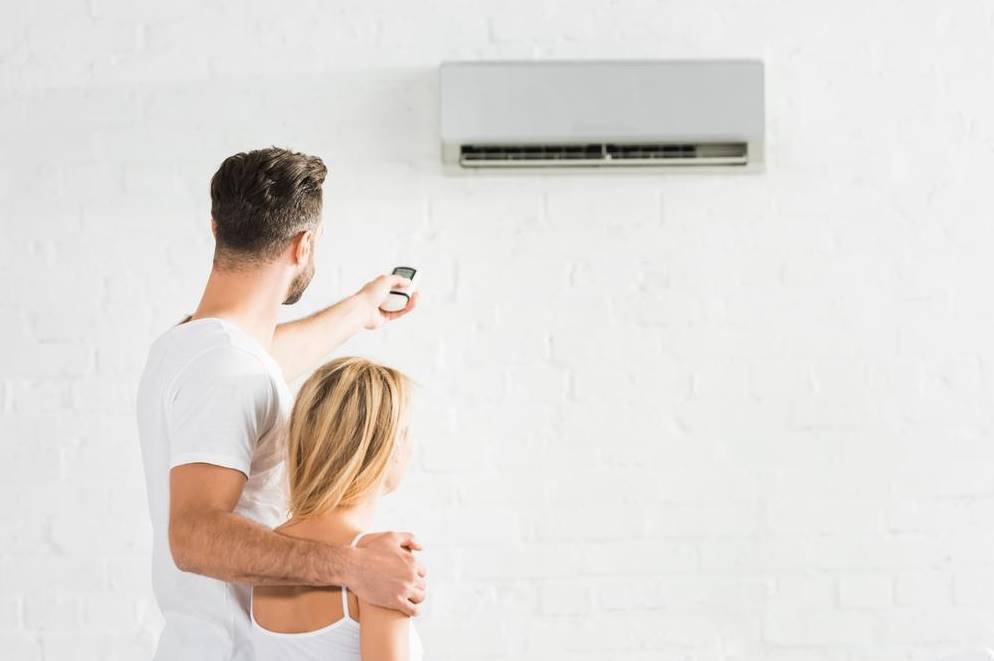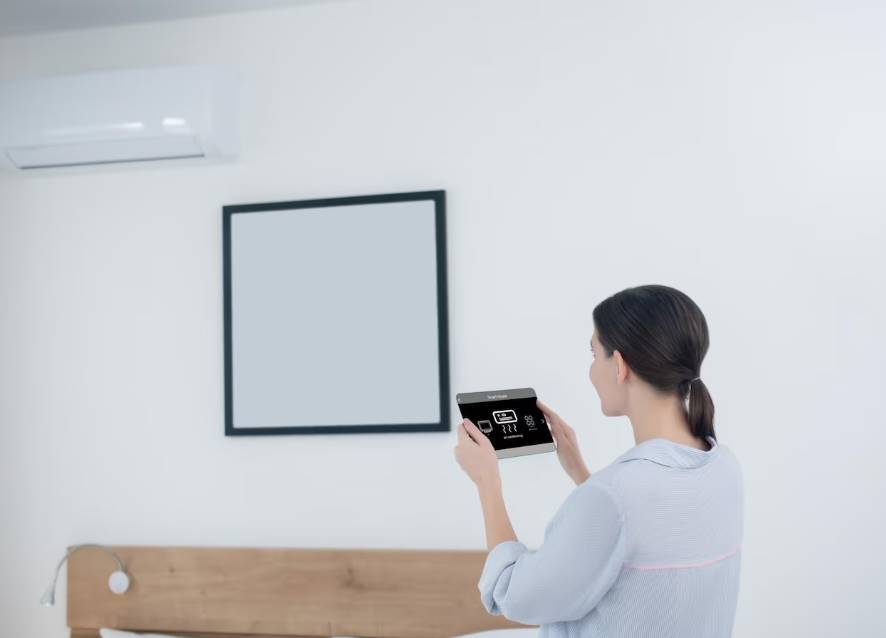Do you feel the intensity? During the long summer, when the sun is hottest, one thing becomes abundantly clear: air conditioning is a boon. This is your fortress against the sweltering heat wave. However, many options exist when deciding on a home air conditioning system. Never fear; we've got your back. In this tutorial, we'll explain all you need to know about air conditioning systems in simple terms so you can make a smart purchase and maintain your cool.
The Importance of Air Conditioning
Envision yourself suffering through the summer's oppressive heat without the benefit of an air conditioner. We'd all prefer to steer clear of such a situation. The use of air conditioning has grown commonplace because of the relief it provides from the heat. To assist you in selecting the air conditioning system that best meets your needs, we'll go deep into the topic throughout this article.
Considerations for Choosing an Air Conditioner
Many factors, such as the local climate, financial constraints, and environmental priorities, should be considered when deciding on an air conditioning system. Let's talk about what matters when deciding this.
Efficiency
If you're in the market for a new air conditioner, energy efficiency should be one of your top priorities. Invest in more efficient HVAC units to save money and resources later on.
Capacity
Find the programme that works best in your area. Consider installing a central system if you need something that can cool or heat your house. Ductless mini-splits are great for single-room climate management.
Maintenance
Keeping your air conditioning system in good working order after installation may require occasional maintenance. Find out what regular maintenance you should be doing on your air conditioner by doing some research.
Price
One of the primary considerations when shopping for a new air conditioner is the cost. Some applications, like energy-efficient central air conditioning installation, may have a greater initial cost but save you money. When deciding on an HVAC contractor, it's important to remember that you usually "get what you pay for," so it's best to work with a business that provides high-quality services at a reasonable cost.
Types of Air Conditioning Systems
Window Air Conditioners
If you don't have ducting in your home, a window air conditioner can be used to chill the entire space, or it can be used to supplement cooling in a single room. While window air conditioners aren't unusual, they typically don't compensate for their drawbacks regarding comfort or efficiency.
Window Ac Pros.
Compared to other air conditioners, window units are more compact, portable, and simple to set up. In addition to being the most cost-effective choice, they are also the least expensive way to cool your home. Compared to models made just a decade ago, today's models can be up to 30% more efficient. In addition, many have guarantees of up to five years, giving you confidence in your purchase.
Window Ac Cons.
Remember that window units aren't designed to chill an entire room or house. If you reside in an apartment building, you'll still need many units to ensure everyone inside is always at a suitable temperature. You'll lose a window for every unit you set up all summer. In addition, there are noisy compressors in each room. Setting up and taking down a larger unit could be difficult. High ceilings, many windows and doors, strong sunlight, and cooling in an upper-floor room can all reduce the effectiveness of a window air conditioner.
Central Air Conditioner
A classic central air conditioner is a great choice for year-round comfort at home. This method is now the norm because it first appeared in the 1970s. Central air conditioning (A/C) systems use fans and ducting to bring cool air from a single location throughout a building or home. A central outdoor air conditioner works with a furnace's evaporator coil to remove excess heat from the home's interior. In Ohio, central air conditioners are a common HVAC application due to their efficient cooling of homes.
Central Air Conditioning Pros.
A central air conditioning system is the most effective approach to cool down the entire house. This system helps you save money on energy costs while still keeping your home at a pleasant temperature and relative humidity level. You may relax comfortably with the system's noisy, visible components placed outside.
If your home already has ductwork, our expert specialists will have an easy time installing your new system. Installing central air conditioning in your home is a wise long-term investment.
Central Air Conditioning Cons.
If you want your central air conditioner to last for many years, you need to have it serviced once a year. You should expect greater initial expenditures, especially if ducting installation is required. Ductless mini-split air conditioners are convenient; however, replacing an old central air conditioner is less expensive.
The last thing to consider is how big of an air conditioning unit you'll need. A unit that is too small will struggle to keep up on the warmest days. If your air conditioner is too big for the space, it constantly turns on and off, causing premature component failure.
Licenced contractors size central air conditioners and ductless mini-split systems to match your home's demands. This is another argument favouring having an HVAC system professionally installed in your home.
Ductless Mini-Split
Mini-split ductless HVAC systems are becoming increasingly common across the USA. One of the most effective methods of cooling a home, heat pump systems may be set up to cool or heat individual rooms without installing ducts. While split systems can cool a whole home, they are most typically employed as a supplementary cooling system for a particularly difficult-to-condition room or space. In a two-story house with high ceilings, a mini-split air conditioner is ideal for a room extension, sunroom, or second floor.
Ductless Mini-Split Air Conditioning Pros.
Mini-splits are more space- and energy-efficient than conventional air conditioners, and they can cool specific rooms as needed. It's the next best thing to having central air conditioning installed, short of ripping out your ceiling and walls. Because they are heat pumps, mini-splits may also warm your home in the winter. A ductless system has the extra benefit of being as quiet as a regular fan. Because its compressor is housed externally, it operates at a far lower decibel level than a window or portable model. Better home security, unrestricted window movement, and a clear view of the outside benefit from doing away with the need for a unit or exhaust to cover the window.
Ductless Mini-Split Air Conditioning Cons.
In comparison to window and portable air conditioners, ductless mini-splits are pricier. A three-inch hole must be drilled into the wall to connect the interior and outdoor parts, so you should employ a professional installer. Because it will be attached to the wall or ceiling, it is important to consider how it will look in the space.
Portable Air Conditioner
A portable air conditioner, often known as a window air conditioner, is a freestanding cooling system that may be moved from room to room as needed. A portable air conditioner's warm air exhaust must be directed outside the building, typically through an open window.
Portable Air Conditioner Pros.
Compared to window models, portable air conditioners are a breeze to set up. The hose exiting the window does not hinder your vision, and the floor unit is on wheels for easy positioning and relocation. The hose can be removed from the window quickly and easily whenever the weather permits.
Portable Air Conditioner Cons.
Consumer Reports found that even when running at full blast, portable air conditioners typically only provide cooling capacity equal to half of what is advertised. Additionally, they are often more expensive to buy and operate than window units of the same size. Portable air conditioners reduce humidity but are loud and need regular reservoir maintenance.
Smart Air Conditioner
Any items on this list can combine to form a smart air conditioner. A smart air conditioner, whether a window unit, a portable, or a central air conditioner, will have upgraded features, including more efficient cooling, quieter operation, and voice control via Amazon Alexa and Google Home.
Hybrid / Dual Fuel Air Conditioner
A dual-fuel air conditioner uses a gas furnace and electric heat pump. In the summer, heat pumps function similarly to air conditioners, cooling your home. In the winter, they may successfully heat your home when the temperature outside drops to around thirty or thirty-five degrees. When the temperature outside falls below thirty degrees, your furnace, whether natural gas or propane, will automatically start to heat the air inside your home. To circulate air under the system, a heat pump sits off the ground on plastic "feet," whereas an air conditioner looks the same.
Cassette Air Conditioner
The majority of homes have ceiling-mounted cassette air conditioners. Because the cool air sinks to the room's floor, conditioning is more uniformly distributed, making cassette air conditioners popular in commercial and residential settings like flats and offices.
Conclusion
Local climate, budget, and environmental concerns should be considered while choosing an air conditioning system. Efficiency is key when buying energy-efficient HVAC units. Maintenance and capacity are also vital.
Central and window air conditioners are the major types. Compact, portable, and affordable window air conditioners may not work for many rooms or residences. Noise and many units are needed to maintain an appropriate temperature. Central air conditioners, which employ fans and ducting to distribute cool air throughout a building or home, provide the best year-round comfort. They save energy expenditures and maintain a comfortable temperature and humidity.
Central air conditioning requires regular service and higher starting costs, especially if ducting is needed. Ductless mini-split air conditioners are convenient, but central AC replacement is cheaper. Too tiny air conditioning units might cause component failure.
It's smart to hire licenced contractors to size central air conditioners and ductless mini-split systems to your home's needs. These variables might help you choose an air conditioning system and keep your home comfortable in summer.
US ductless mini-split HVAC systems are growing more popular due to their space and energy economy. They suit high-ceilinged areas like expansions, sunrooms, and second floors. Min-splits are quieter, safer, and clearer than normal fans. However, they cost more and require professional installation.
Freestanding portable air conditioners exhaust warm air outside the building and can be moved from room to room. They're straightforward to install and uninstall. They provide half the quoted cooling capacity and cost more to buy and operate than window units.
Smart air conditioners offer quieter operation, more effective cooling, and Amazon Alexa and Google Home voice control. When it gets cold, dual-fuel air conditioners employ a gas furnace and electric heat pump to heat the home. Ceiling-mounted cassette air conditioners distribute cool air uniformly, making them popular in business and residential settings.
Content Summary
- To get some reprieve from the heat of summer, air conditioning is absolutely necessary.
- You will learn how to select the ideal home air conditioning system by following the steps in this tutorial.
- Considerations pertaining to climate, finances, and the surrounding environment all play a significant role in the decision-making process.
- When shopping for a new air conditioner, you should put a premium on selecting one that has a high energy efficiency rating.
- Your cooling and heating needs should be matched by the capacity of the system, with options including central systems and ductless mini-splits.
- It is imperative that you perform routine maintenance on your air conditioner in order to keep it in good functioning condition.
- Price is the most important factor to take into account, and making an initial investment in models that are more energy-efficient can lead to long-term cost savings.
- Window air conditioners are convenient and cost-efficient, but they do not come without drawbacks.
- Although they are effective at cooling the entire house, central air conditioning systems require maintenance on a yearly basis.
- It is essential to adequately size the unit in order to avoid inefficiencies and the failure of components before their expected lifespan.
- Mini-split ductless air conditioners provide both space and energy economy, making them perfect for individual rooms or areas.
- During the colder months, they can also serve as a source of heating.
- Mini-splits are more aesthetically pleasing and less noisy than window or portable units of the same capacity.
- Portable air conditioners are simple to carry, but their cooling capacity could not live up to the claims made by the manufacturer.
- They often have a higher cost of operation compared to window units.
- Intelligent air conditioners include additional capabilities and can be controlled by voice.
- Dual fuel air conditioners combine heat pumps and gas furnaces to provide comfort throughout the entire year.
- Air conditioners that use cassettes are popular in both household and business settings because of their consistent cooling.
- In order to maintain a pleasant temperature throughout the warm summer months, air conditioning is absolutely necessary.
- The goal of this blog is to make it easier to decide which type of house air conditioning system is best for you.
- Your choice need to be influenced by a number of considerations, including things like geography, finances, and worries about the environment.
- When shopping for a new air conditioner, put a premium on one that has a high energy efficiency rating to cut costs and conserve valuable resources.
- When deciding between a central system and ductless mini-splits for your space, make sure to take into account the required capacity.
- It is imperative that you perform routine maintenance on your air conditioner in order to keep it in the best condition possible.
- Although cost plays a crucial role, consumers should also take into account the potential for long-term cost savings when selecting energy-efficient models.
- Air conditioners that are installed in windows are convenient and inexpensive, but they might not be able to properly chill larger rooms.
- The entire home can be cooled with a central air conditioning system, although these systems require more frequent maintenance.
- In order to avoid inefficient operation or the failure of individual components in central systems, accurate sizing is essential.
- Ductless mini-split systems are appropriate for particular rooms or areas because to their high level of energy efficiency.
- They can also provide warmth throughout the winter months, so enabling comfort throughout the entire year.
- Mini-split air conditioners are more aesthetically pleasing and operate more quietly than window or portable units.
- Although portable air conditioners are simple to transport, they don't always live up to their promised level of cooling capacity.
- When compared to window units of the same size, they can have a higher cost of operation than central air conditioners.
- Smart air conditioners offer a variety of control options, including voice activation, more advanced capabilities, and a quieter operation.
- Dual fuel air conditioners combine heat pumps and gas furnaces, making them suitable for use throughout the year in a variety of settings.
- Because of the consistent level of cooling they provide, cassette air conditioners are frequently used in both residential and business settings.
- Cassettes that are positioned on the ceiling ensure that cooled air is distributed uniformly throughout the space.
- It is necessary to do routine maintenance on a cassette air conditioner in order to maintain it operating at peak performance.
- When selecting cassette air conditioners for specific situations, aesthetics and efficiency are both important factors to consider.
- For your comfort during the warm weather, select an air conditioning system that takes into account both your requirements and your financial constraints.
Frequently Asked Questions About Air Condition
The most energy-efficient system depends on factors like the size of your space and climate. Generally, ductless mini-split systems and energy-efficient central air conditioners are good options. Energy Star ratings can help identify efficient models.
The capacity, measured in BTUs (British Thermal Units), should match your space's size. Factors like insulation, local climate, and the number of occupants influence the calculation. An HVAC professional can perform a load calculation to determine the appropriate capacity.
Regular maintenance is crucial. Tasks include cleaning or replacing filters, checking refrigerant levels, inspecting ducts, and scheduling professional servicing annually. Proper maintenance ensures optimal performance and longevity.
Smart air conditioners offer convenience through features like remote control and scheduling. They can also be more energy-efficient due to better temperature management. Whether it's worth it depends on your preferences and budget.
Dual-fuel systems combine a heat pump and a gas furnace. They are versatile, providing efficient cooling in summer and heating in winter. They automatically switch to the furnace when temperatures drop significantly, offering energy savings and year-round comfort.



